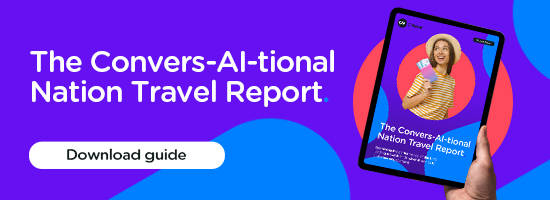- Deliver customer service at scale and at speed
- Be where your customers are
- Really understand your customers
- Automate and innovate
- Unique challenges
Financially, the UK airline industry took a massive hit from the pandemic, with a $34.5B loss in 2021, shrinking to a still formidable $11.9B in 2022 and a predicted $3.9B loss in 2022, according to the IATA.
That’s largely due to a nosedive in passenger numbers, from 153.7m passengers in 2019 to just 32.35m in 2020 and 28.76m in 2021, based on Civil Aviation Authority numbers. Even more telling is the drop from over 85% occupancy on UK airlines’ international flights in 2019 down to just 65% in 2020.
The issues might be widespread, but the solution to many of the travel industry’s woes is relatively simple. It all comes down to communication.
Deliver customer service at scale and at speed
Customer service issues were the cause of many complaints during the summer of ‘22, with travellers incensed by a lack of information and last-minute cancellations. Much of that anger might have been avoided, or at least tempered, with better customer communication. If the issue is a lack of staff or larger-than-expected passenger numbers, then automating the delivery of information is critical.
Our Mobile Service Cloud solution offers customer service teams the tools to communicate effectively with customers and collaborate with other members of their teams. It also gives them some much-needed respite from manually handling consumer enquiries via chatbots. Chatbots are a great example of technology that benefits both customers and customer service teams. AI chatbots can deliver up-to-the-minute updates to travellers at the tap of a touchscreen with no decline in performance when things get busy.
Early morning or late nights can test the patience of even the most seasoned traveller, and it’s made worse when travellers can’t get hold of vital information when they need it. With just 20% of travel companies offering 24-hour customer service and only 32% having implemented a chatbot, according to our Convers-AI-tional Nation research, finding information outside office hours is a significant problem for travellers. Chatbots are adept at handling out-of-hours enquiries, delivering the right guidance to travellers exactly when they need it. Modern customer service means being there when your customers need you. Chatbots allow you to do just that.
Be where your customers are
We know that customers expect to be able to talk to brands on the channels they’re familiar with, and that’s doubly important when your customers are on the move and might not have access to all their devices all the time. With just 60% of brands surveyed in our recent research offering a customer service email, let alone anything more sophisticated, it’s clear the industry is lagging behind. Brands should ensure they operate across a broad spectrum of platforms to ensure they’re available when the customer needs them, regardless of device or channel. To that end, creating an omnichannel conversational strategy makes your brand accessible to everyone, wherever they are.
Scheduling notifications with timely information is one function of conversational channels that can help to keep stressed travellers calm and up to speed. Location-based platforms such as Google Business Messages are also perfect for providing information to travelling customers.
Finally, it pays to be exhaustive in your channel adoption. SMS would probably be reasonably far down the list if we asked you to name your most important conversational channels. However, with a 98% open rate and access to every mobile device on the market, you shouldn’t underestimate its power.
Really understand your customers
Treating customers as individuals has never been more critical; Adobe research found that 76% of respondents wanted businesses to treat them like individuals. With temperatures often already elevated due to the stresses inherent in travel, customers will want to know they’ve been listened to and will (understandably) hate the idea of repeating themselves while they get passed from pillar to post. That’s why it’s vital that previous interactions are recorded and catalogued for customer service teams to access and get up-to-speed quickly.
A Customer Data Platform can store interactions across platforms and help your team understand customers’ circumstances to quickly provide help when needed. From a marketing perspective, moving from talking to segmented personas to talking to real people can significantly impact engagement and ROI from marketing campaigns.
Automate and innovate
With a Customer Data Platform in place, automating your marketing campaigns becomes simple. You can use your CDP data to create smart, targeted campaigns that resonate with your audiences and you can build them with the confidence that you know your audience thanks to the vast volume of data you can access. Our Mobile Marketing Cloud solution has all the tools you need to build creative campaigns and test and tweak them in real time with simple-to-use automated workflows.
Unique challenges
Given the unique challenges associated with the travel industry and the minute-by-minute changes that can occur, technology offers a solution to traveller uncertainty and the pitfalls of poor customer service. In both senses of the phrase, automating the customer journey makes perfect sense.
Remember, you don’t have to do everything at once, and building a technology solution needn’t eat up your entire marketing budget. In fact, in many cases, these solutions will save you money. The question is, can you afford not to automate your processes in the current climate?

